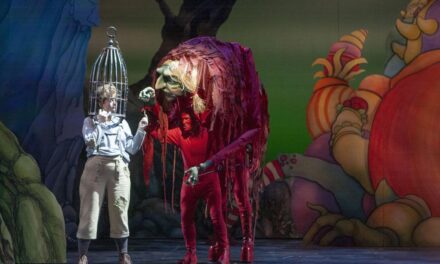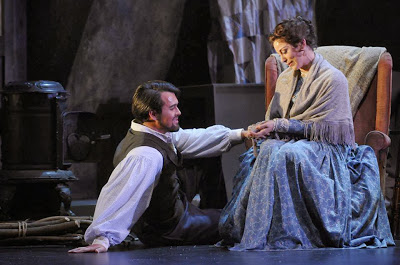(AP Photo/Timothy D. Easley)
Mozart Requiem
Teddy Abrams, conductor
Kent Hatteberg, chorusmaster
Jessica Rivera, soprano
Kendall Gladen, mezzo-soprano
Jesse Donner, tenor
Evan Boyer, bass
Louisville Chamber Choir
Louisville Collegiate Chorale
Review by Shaun Kenney
Entire contents are copyright © 2018 by Shaun Kenney. All rights reserved.
It seems fitting at this time of year when the green of summer is dying away and transforming into the brilliant colors of autumn, that the Louisville Orchestra should perform a requiem mass, a mass for the dead, by a composer who himself was fading away as he wrote it. In fact, Wolfgang Amadèus Mozart left his Requiem in D minor incomplete upon his death in 1791. His wife, Constanze, implored Franz Xaver Süssmayr, a former student of Mozart’s, to complete the work, which he did, allowing Constanze to collect the remaining commission funds. Since the early 1970’s there have been several attempts by composers and musicologists to write alternative completions to the work. There is even a tongue-in-cheek episode of Amazon’s Mozart in the Jungle where the Requiem is completed by a robot who goes by the clever name of WAM. Tonight though, the Louisville Orchestra, along with the Louisville Collegiate Choral, Louisville Chamber Choir, and featured soloists, presented us with the work completed by Süssmayr.
The concert opened with the rarely performed Vespers of 1610 (“Vespers of the Blessed Virgin”) by Claudio Monteverdi. A pared down orchestra accompanied the Louisville Chamber Choir in this gorgeous and ethereal work of the early Baroque era. The clear, straight tonality of vocals in this era is something that has always appealed to me as I find it a purer sound than that of someone singing with a vibrato. This piece by Monteverdi is an excellent representation of this vocal quality and I was extremely impressed by how well the choir, the soloists, in particular, performed the work. Unfortunately, the soloists were not mentioned individually in the program so I’m unable to recognize them here but their performances were stellar. This composition is divided into 13 movements, each corresponding to a part of the Vespers or evening mass service in the Catholic tradition. Conductor Teddy Abrams selected 7 of these sections for the concert. The first movement opens with a plainsong chant, “Deus, in adjutorium meum intende” (Make haste, O God, to deliver me) intoned by a tenor who was placed offstage at the edge of the audience. The choir, divided into 6 parts here, then joins with “Domine, ad adjuvandum me festina” (Make haste, O Lord, to help me) on a repeated D major chord accompanied by trumpet fanfare from the orchestra. The sound resonated around the room, enveloping us in its richness. I knew at that moment, having never heard this work before that I was in for a beautiful experience. And that it was. I will say though, that by the end of the work, almost an hour later, I was a little bored. I in no way blame this on the orchestra or the choir, as their performance was practically perfect. I just found it to be a bit repetitive. Though there was definitely some variance in style and texture, the movements all sort of blurred into one another. Perhaps split up over the course of a vespers service the individual sections would be a bit easier to digest, as the ear would have time to rest in between them. But presented as a whole, it, unfortunately, didn’t captivate my interest for the entire performance.
The Mozart, however, was another story. I was engaged from beginning to end. Though there is some repetition of themes throughout, each movement is unique enough that the work is successful whether performed in whole as it was here or in pieces, as it has been in countless movies from Elizabeth (Introitus: Requiem) to Eyes Wide Shut (Sequenz: Rex tremendae) to The Life of Brian (Sequenz: Dies irae). There are eight main sections in this work with movements III and IV being subdivided for a total of 14 sections. Yet again, the orchestra; choirs; and soloists Jessica Rivera, Kendall Gladen, Jesse Donner, and Evan Boyer impressively performed this work of art. The audience was so affected by it that many ignored the tradition of holding applause until the very end and after hearing the climax of the second movement, Kyrie, broke out in gasps and other showings of appreciation. The work, unsurprisingly, elicited a well-deserved standing ovation at the end.
Overall I was very impressed with this performance. If I had one criticism it would be this; because the soloists all sung with such operatic vibrato I found it difficult to pick out individual notes and differentiate between words that were sung. This was especially true of the bass soloist. Now, this is strictly a matter of personal taste about vibrato and is absolutely no reflection on the skill and accuracy with which the soloists performed. It is also possible that this was simply due to the way sound resonates differently depending on the listener’s relative position and the acoustics that position provides. This small criticism aside, this was a concert I was very much looking forward to and it did not disappoint.
I would like to take a moment to recognize the most moving part of the evening. As we returned from intermission and the orchestra and chorus made their way back to the stage, Teddy Abrams and Mayor Greg Fischer took a moment to discuss the recent tragedies here in Louisville on Wednesday, October 24th and in Pittsburgh the morning of the concert. Mayor Fischer reminded us of ways we could help and participate in vigils recognizing the victims and asked for a moment of silence. There is nothing quite like a moment of silence in a large crowd. It requires that every single person is involved and unified. No coughing, clearing throats, or opening candy wrappers. Even the woman in front of me, who quite honestly was whispering to her date throughout the entire performance, was able to keep quiet for a moment. All snarkiness about people who talk during performances aside, this was the most beautiful moment of the evening: all of us, together, making a supreme effort to be silent. In this case, the absence of sound spoke volumes. Following this, Mozart’s Requiem was a perfect and apropos tribute to the departed souls of these two tragedies and was made even more meaningful by the silence preceding it.
Mozart Requiem
October 27, 2018
Louisville Orchestra
Whitney Hall, Kentucky Center for the Arts
501 W Main St
Louisville, KY 40202
Louisvilleorchestra.org
Shaun Kenney studied Music Education and Instrumental at Campbellsville University. In Louisville, he has worked with Finnigan Productions since its inception, as Stage Manager, Sound Designer, and Director.





